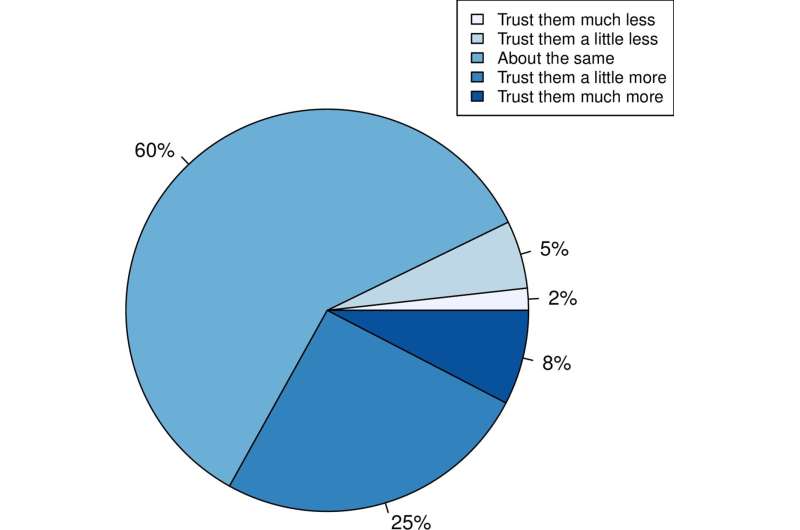Study finds COVID-19 pandemic increased, but also polarized, trust in science

Research by the Milner Center for Evolution at the University of Bath, U.K., along with colleagues at Universities of Oxford and Aberdeen, finds that trust in scientists has hugely increased overall since the COVID-19 pandemic, but that attitudes have also become more polarized. The study also found that people were more likely to take the COVID-19 vaccine if their trust in the science had increased.
Whether it be climate change, vaccines or GM foods, trust in science and scientists has rarely been more important. But can trust be changed? Does change in trust reflect change in behavior?
Using data from a survey of more than 2,000 U.K. adults commissioned by the Genetics Society, the team asked individuals whether their trust in scientists had gone up, down or stayed the same.
A third of people reported that their trust in scientists had gone up. To see whether this was associated with the COVID-19 pandemic response, they were also asked whether trust in “geologists” and “geneticists” had changed, geologists having no obvious involvement with the COVID-19 response, and with geneticists being involved but with less prominent recognition for their involvement.
They found that very few reported a change in trust in geologists but many increased trust in geneticists.
Participants were also asked about their change in trust in the pharmaceutical industry. When Pfizer, a company that made COVID-19 vaccines, was used as an example, more people reported a positive response than when GlaxoSmithKline, a company not associated with the COVID-19 vaccine, was mentioned.
These results indicate that science activity and communication during COVID-19 pandemic has for the most part led to increased trust, in contrast with reports from much earlier in the pandemic.
When the team investigated why there was variation in people’s response, they found that, even controlling for multiple demographic factors (educational attainment, political inclination, religious belief and age), people who reported holding a negative view of science prior to the pandemic had become even more negative.
In contrast, those who were originally positive had become even more positive.
Perhaps most significantly, when they asked people if they have had or plan to have the vaccine, those reporting increased trust were most likely to take the COVID-19 vaccine. Those preferring not to do so reported a decline in trust.
Professor Laurence Hurst, from the Milner Center for Evolution, said, “Our research shows that although trust in science has increased overall, it has also become more polarized.
“Why does this matter? For many years it was assumed that scientific knowledge is what determines attitude to science, hence the proliferation in science communication activities to increase understanding.
“Our study provides evidence to support the theory that trust, rather than knowledge is what matters. This research also suggests that activity to increase trust does indeed affect behaviors.
“But the same strategies can also backfire causing some to be even more entrenched.”
The research was led by Sofia Radrizzani, an undergraduate student at the Milner Center for Evolution when she performed this research and Professor Laurence Hurst, and is published in PLOS One.
More information:
Sofia Radrizzani et al, Both trust in, and polarization of trust in, relevant sciences have increased through the COVID-19 pandemic, PLOS ONE (2023). DOI: 10.1371/journal.pone.0278169
COVID-19 and the Public Perception of Genetics: genetics.org.uk/wp-content/upl … tion-of-Genetics.pdf
Citation:
Study finds COVID-19 pandemic increased, but also polarized, trust in science (2023, March 29)
retrieved 30 March 2023
from https://phys.org/news/2023-03-covid-pandemic-polarized-science.html
This document is subject to copyright. Apart from any fair dealing for the purpose of private study or research, no
part may be reproduced without the written permission. The content is provided for information purposes only.
For all the latest Science News Click Here
For the latest news and updates, follow us on Google News.

